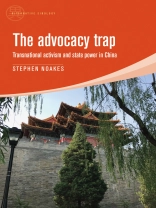What does China’s rise mean for transnational civil society? What happens when global activist networks engage a powerful and norm-resistant new hegemon? This book combines detailed ethnographic research with cross-case comparisons to identify key factors underpinning variation in the results and processes of advocacy on a range of issues affecting both China and the world, including global warming, intellectual property rights, HIV/AIDS treatment, the use of capital punishment, suppression of the Falun Gong religious movement, and Tibetan independence. Built on a unique blend of comparative and international theory, it advances the notion of “advocacy drift”—a process whereby the objectives and principled beliefs of activists are transformed through interaction with the Chinese state. The book offers a timely reassessment of transnational civil society, including its power to persuade and to leverage the policies of national governments.
विषयसूची
Introduction: the superpower’s dilemma: to appease, repress, or transform transnational advocacy networks?
1 Mechanisms of persuasion: when and how are advocacy campaigns effective?
2 The power of state preferences: the ‘natural cases’ of the campaigns for Falun Gong and IPR protection
3 Reading the ‘lay of the land’: intercessory advocacy and causal process in the HIV/ AIDS treatment and death penalty abolitionist campaigns
4 State- directed advocacy: the ‘drift’ phenomenon in the ‘free Tibet’ and global warming campaigns
5 Strategic considerations, tough choices: how state preferences influence campaign forms
Conclusion: state power as reality
References
लेखक के बारे में
Stephen Noakes is Lecturer in Politics and International Relations and Asian Studies at the University of Auckland












